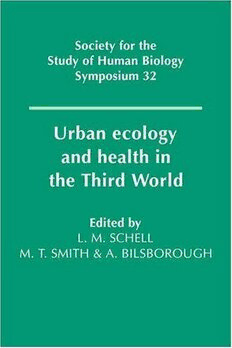
Urban Ecology and Health in the Third World (Society for the Study of Human Biology Symposium Series) PDF
301 Pages·1993·8.266 MB·English
Most books are stored in the elastic cloud where traffic is expensive. For this reason, we have a limit on daily download.
Preview Urban Ecology and Health in the Third World (Society for the Study of Human Biology Symposium Series)
Description:
This volume looks at the relationship between specific aspects of Third World cities and human health. Rapid and extensive urbanization of the less developed nations is perhaps the most dramatic demographic phenomenon of our times, but its impact on human biology is not well understood. Here, a cross-section of work is presented on this subject allowing human biologists, urban planners, public health workers, and other specialists to assess our knowledge and the current approaches available to increase it. Contributions fall into two groups: studies of urban ecology including the social, economic and physical domains, and studies of biological responses to the urban environment. Health is not merely the absence of specific diseases, but is construed more broadly to include a wide range of biological parameters that are correlated with various states of suboptimal health. These include patterns of child growth and development, frequencies of specific diseases, nutritional status, immunological characteristics and physiological parameters.
See more
The list of books you might like
Most books are stored in the elastic cloud where traffic is expensive. For this reason, we have a limit on daily download.
